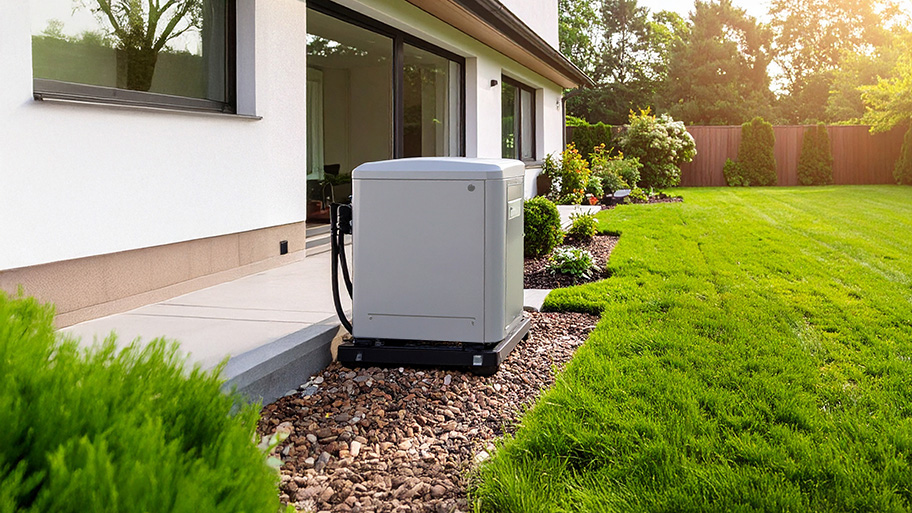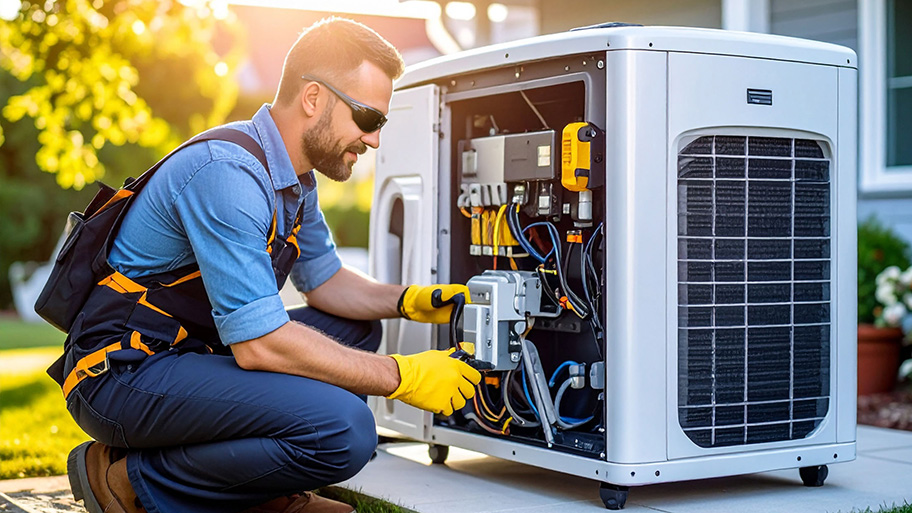
The average cost of a whole-house generator falls between $5,000 and $25,000. Keep reading to learn how much you can expect to spend.
Is adding a generator the ultimate power move for homeowners?


Most gas and oil furnaces won’t work without power, so a generator can keep your family warm and prevent your pipes from bursting in cold climates.
Generators become especially important if you or someone you love relies on durable medical equipment (DME).
Generators can also help homeowners to avoid food spoilage and loss.
More and more remote workers are turning to generators to ensure that a power outage doesn't destroy productivity.
Are you debating whether you should buy a generator for emergencies? With whole home generators totaling $700 to $26,000, many homeowners want to know if the investment is worth it. A generator can be a true lifesaver if you live in a part of the country with extreme weather or temperature fluctuations. But the truth is that all homes in every location would be better off with a generator. Here are the seven factors to consider when buying a generator.
An emergency generator is a back-up power source that can generate electricity in the event of a power outage or other emergency. There are many types of generators, ranging from large gas emergency generators to battery-powered versions. The purpose of an emergency generator is to provide power to your essential appliances and items for as long as possible to help your household members weather the electrical emergency.
If you live in an area prone to natural disasters or frequently experiences power outages, consider installing a partial or whole-house generator to ensure your home has a backup power supply.

If you live in a part of the country that regularly sees freezing temperatures, having a generator can be a matter of safety and survival as most oil and gas household furnace systems rely on electricity to run. Plus, power outages that occur in freezing temperatures can also cause pipes in your home to burst. Preparing for a winter storm with a new generator can be one of the best ways to keep humans and pets safe during a power failure.
Though most people think of generators as a cold-weather savior, they can also keep your cooling system up and running when the power goes out in the middle of a heatwave. Getting a generator in a hot climate can be especially important if members of your household have any physical or age-related ailments that make them unable to withstand extreme heat.
If you live in an area that’s prone to wildfires, you may consider purchasing and installing a generator to ensure you have a back-up power source in the event of a fire emergency. Unfortunately, power outages happen frequently during wildfire season, especially in states like California. To stay prepared for this type of emergency, consider installing a generator to your home with the help of a local generator installer to ensure your household can continue running essential appliances and outlets during a wildfire.
Does someone in your household rely on life-sustaining medical equipment powered by electricity? If so, even short power outages can lead to an emergency if you don't have a backup solution. Pieces of durable medical equipment (DME) like oxygen generators and ventilators often come with battery packs that only last for a few hours.
Prioritize having a generator installed if you'd like to have the ability to stay at home caring for a loved one instead of finding a care location when the power unexpectedly goes out. You can also consider paying a little extra for an automatic transfer switch that will keep everything running if the power goes off during the night.
If you collect or sell valuables, you may have a room kept at a certain temperature to maintain perfect air quality and humidity levels. A prolonged power outage can destroy the integrity of your valuable possessions. You may actually be able to declare the cost of your new generator as a business expense if you earn income from your collectibles.
Every bulk shopper understands the importance of a deep freezer, which often holds weeks’ worth of pricey meals at any given time. Power outages can lead to big losses if you stock up using multiple freezers or refrigerators. Backup power generators enable you to preserve valuable food items instead of watching them spoil.
If your ability to get work done depends on staying connected using your computer, having power is essential. Remote workers are gravitating toward generators for obvious reasons—even just a few hours of not having power can throw your work life into a tailspin (*immediately clicks the save button). A prolonged power outage lasting several days can be completely unmanageable for people who work from home.
Choosing the right size generator comes down to deciding if you want to focus on simply powering your furnace, keeping a core group of essentials running, or lighting up the whole house.
First, calculate the wattage required for your home if the power goes out. There are four main types of generators with different wattage outputs and price ranges:
Recreational generators up to 2,000 watts: $400–$1,000
Mid-sized generators up to 3,500 watts: $1,000–$1,700
Large/portable generators up to 7,500 watts: $1,400–$4,000
Home standby up to 20,000 watts: $2,000–$6,000, not including installation
A small recreational generator should be more than enough if you just want to keep the lights on. If you need to power larger appliances like a refrigerator, you can often get by with a midsized generator. A large generator or home standby will be necessary if you need to keep heating, air conditioning or critical medical equipment running.
If you cannot go without power for even a minute, you will need to hire a local electrician to install a transfer switch to ensure the generator turns on immediately after an outage. Installing a transfer switch can cost between $2,500 and $2,000.
From average costs to expert advice, get all the answers you need to get your job done.

The average cost of a whole-house generator falls between $5,000 and $25,000. Keep reading to learn how much you can expect to spend.

The cost to install a generator transfer switch depends on several factors. Our guide will help you understand all of the costs.

Keeping on top of generator maintenance and repairs gives you extra peace of mind as a homeowner. Find out how much regular generator maintenance costs.

Before installing a fixed generator, think about your use and space. Review these backup generator questions to prepare for a talk with your contractor.

Wondering who to hire to install a generator? Consult this guide to learn who to hire to install a generator or a transfer switch.

Generator maintenance is key to keeping your appliance in good condition. Follow our checklists to make sure your generator stays up and running.